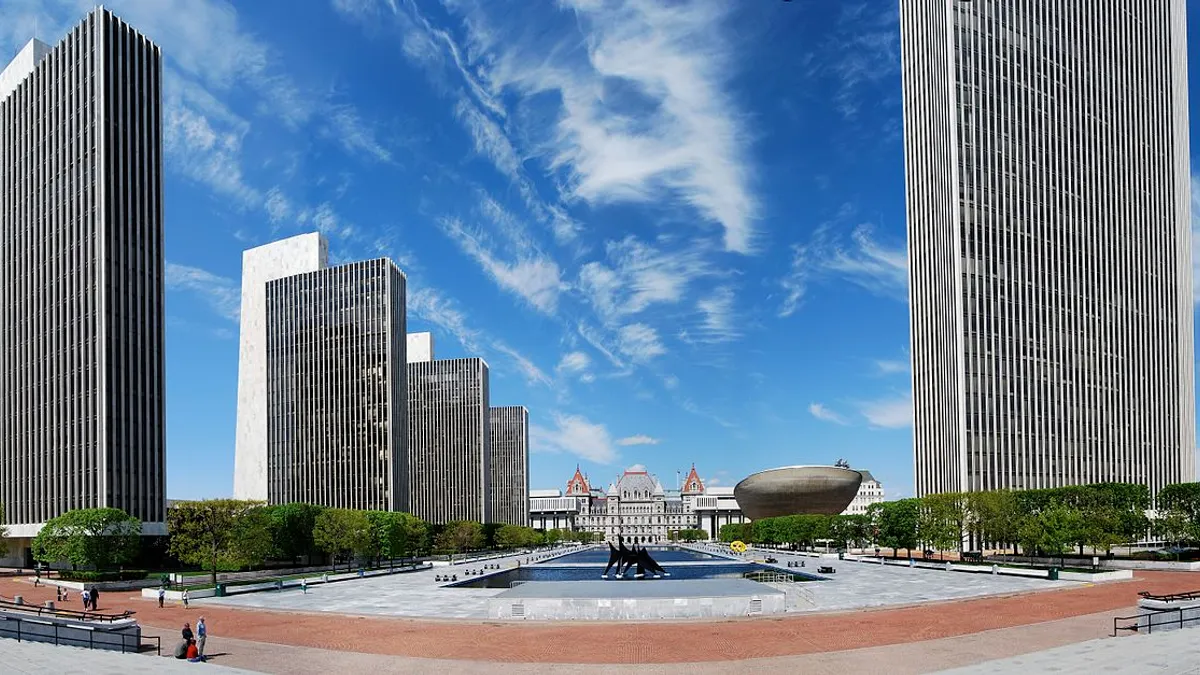Dive Brief:
- The New York state legislature passed multiple waste-related policy changes in its $175.5 billion FY20 budget deal over the weekend. A proposal from Gov. Andrew Cuomo to expand the list of accepted products in the state's container deposit program wasn't among them, but two other key items moved after years of effort.
- Effective January 2022, any establishment that generates more than two tons of food waste per week must separate material for donation and arrange for inedible scraps to be taken to an organics recycler within 25 miles. Temporary waivers will be granted by the state based on factors such as cost and distance.
- Effective March 2020, the state will prohibit distribution of any "plastic carryout bag" (with some exemptions) and allow cities or counties to implement their own five-cent fees on paper bags. New York City, among other local governments, is now expected to take that step.
Dive Insight:
The last days of budget season in Albany are often hectic, with many policies getting added or dropped, and this year's negotiations were no exception. As details emerged into the weekend and final votes were taken on Sunday, it became clear legislators had made multiple significant changes to environmental policy. Some attribute this to the fact that the New York Senate is now controlled by Democrats for the first time in years.
While the plastic bag ban has been getting most of the attention, the organics mandate is arguably an even bigger change. Once enacted, New York will become the sixth state with some version of an organics diversion mandate – following California, Connecticut, Massachusetts, Rhode Island and Vermont.
Similar versions of this proposal have been backed by Cuomo and other state lawmakers for multiple years, but repeatedly got cut from final budget deals and weren't taken up separately in prior legislative sessions. If the policy works as intended, it will put a notable dent in waste volumes for areas of the state that don't already have commercial diversion mandates in place — all but New York City — and encourage the development of more regional processing infrastructure. Currently, a sizable amount of the city's organic material is traveling to other Northeast states.
The policy's passage also comes with some compromise. The required distance between covered generators and organics recyclers (which will also include animal feed) has been reduced from previous lengths of 50 and 40 miles down to 25. Hospitals, nursing homes, adult care facilities and grade schools are also exempted from complying at all. Ongoing opposition from the healthcare industry was said to be a key issue in 2018. Next, the state's Department of Environmental Conservation is required to determine if sufficient capacity exists by June 2021 before covered establishments are expected to make arrangements for compliance.
That said, the plastic bag news is also notable. Following a 2016 ballot referendum in California, and a de facto ban in Hawaii across every county, New York is the only other state to enact such a policy to date. After the back-and-forth drama that involved New York City passing its own plastic ban/paper fee in 2016, the state legislature overriding that in 2017 and a Cuomo-appointed task force yielding minimal results in 2018, this move is seen as a long time coming. Supporters believe it will lead to a broader culture change around reusable bags, especially if the New York City Council can seal the deal with its own paper bag fee.
As for Cuomo's pitch to expand New York's bottle bill for the inclusion of non-alcoholic beverage containers such as juice, tea-based beverages and sports drinks, there has been little attention given to its demise. Stiff and concerted lobbying pressure from the NWRA, every major recycler in the state, multiple counties and even some environmental groups — all concerned about losing valuable local revenue on PET bottles and aluminum cans — appears to have been successful.















